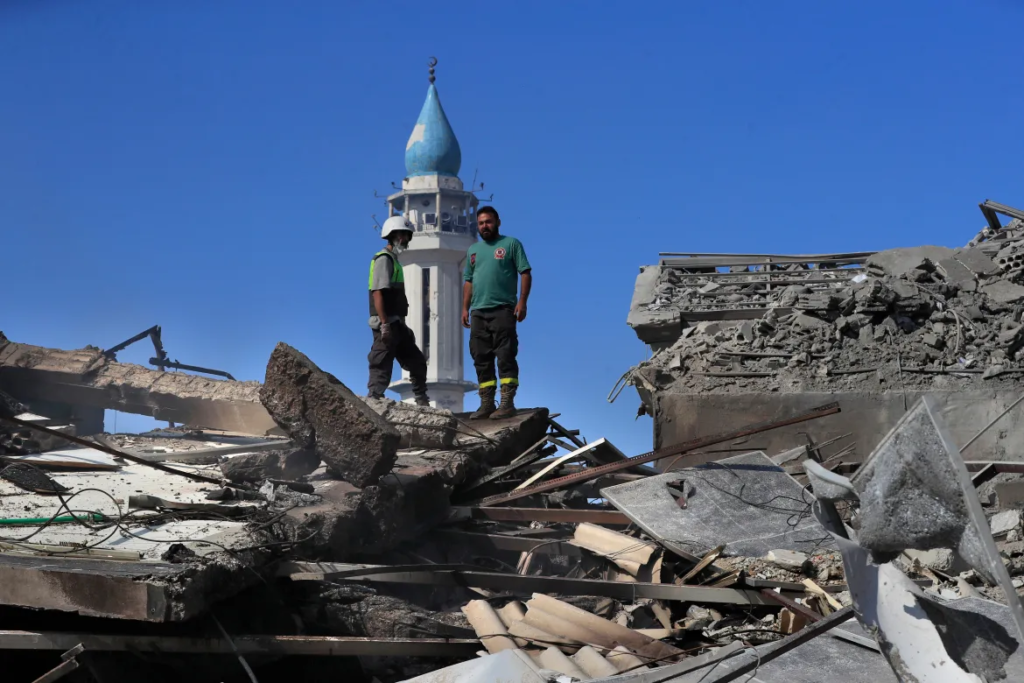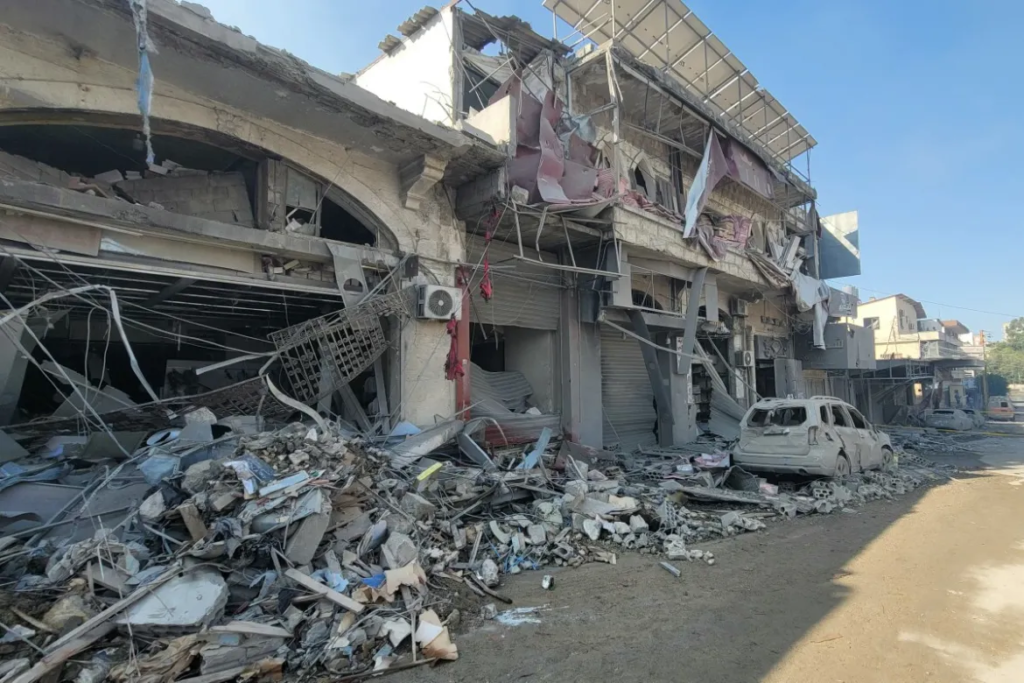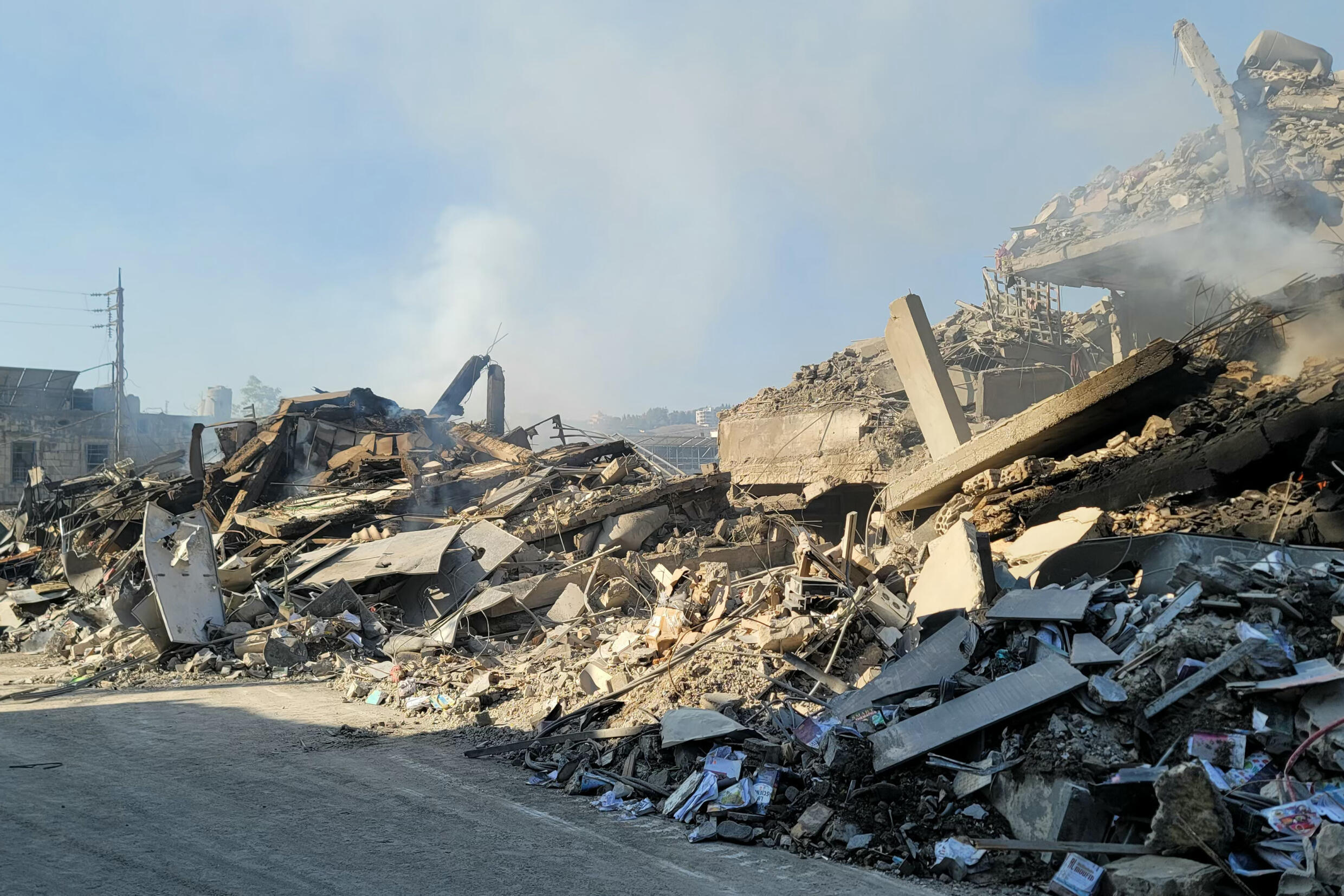The bustling Nabatiyeh market in southern Lebanon has long been the lifeblood of the city, a place where vendors and residents gathered, shared stories, and built their livelihoods. This cherished space was reduced to rubble after Israeli airstrikes targeted the area, leaving devastation in their wake.
The attack, which took place late on a Saturday night, marked a tragic chapter in the escalating conflict between Israel and Hezbollah, which has left many cities and towns in Lebanon scarred by destruction.
The marketplace, once a lively center of commerce, was home to a diverse array of shops and small restaurants. It was where people shopped for clothes, jewelry, sweets, and more. But today, all that remains is rubble and rising plumes of smoke.
As the residents of Nabatiyeh market reel from the shock of this attack, the pain of loss is not just felt in the physical destruction of buildings, but in the obliteration of a cherished space that held deep emotional and cultural significance.
Destruction in the Heart of Nabatiyeh
The marketplace in Nabatiyeh market was more than just a commercial hub—it was the beating heart of the city. Residents like Tarek Sadaka described the scene as if an earthquake had torn through the area. “It’s as if an earthquake shook the Nabatiyeh market. It’s been completely destroyed,” Sadaka said, as he struggled to hold back his tears.
He spoke of the destruction of his beloved neighborhood, where even a simple street corner that once served as a spot for morning coffee had been wiped out.
Read : Discovering Lebanon: Top Ten Selfie Spots for Immersing in History and Beauty
The airstrikes damaged more than the buildings. The bustling atmosphere, the place where friendships were nurtured, and livelihoods were built, had been shattered.
Read : Nicaragua Announces Breaking Ties with Israel
Nabatiyeh, known for its resilience, now lay in ruins, as its residents grieve the loss of their marketplace. The attack, which injured eight people according to Lebanon’s health ministry, has left a profound emotional toll on the community. Flames licked the broken masonry, while black smoke rose from the ruins, filling the air with a suffocating sense of sorrow.
Electrical wiring dangled from the shattered facade of a three-story building, while debris blocked the streets. A lone bulldozer worked to clear the rubble, but for many residents, the emotional weight of the destruction was far greater than the physical damage.
A solitary tree, standing untouched amidst the widespread devastation, served as a haunting reminder of the life that once filled this place.
Nabatiyeh is a city that has withstood numerous challenges over the years, including previous conflicts. But the magnitude of the destruction caused by the recent airstrikes left many in shock. Sadaka, like many other residents, expressed his heartbreak at the destruction of the marketplace and the loss of a vital community space. “Words can’t express what I feel,” he said. “I’m staying here, and I will not leave Nabatiyeh—Nabatiyeh is our motherland.”
Lives Shattered, Livelihoods Lost
For many residents of Nabatiyeh market, the marketplace was more than a place of commerce—it was a symbol of the city’s enduring spirit. People from all walks of life would gather there, forming friendships and creating memories.
The market was home to shops selling clothing, sweets, spices, falafel, and even music, filling the streets with the melodies of traditional Arabic tunes. It was a vibrant, thriving space where generations of families had made their living.
Helmi Jaber, an elderly man who lived nearby, made his way through the market’s ruins on Sunday, navigating the destruction with a cane. His room had been flooded after a water tank was damaged in the attack, and as he looked around at the devastation, he mourned the loss of what had been a key part of the city’s identity. “This was the most beautiful area and the best market in the city,” Jaber said, his voice filled with sorrow.
The market’s destruction has also sparked fears of further strikes. As Jaber explained, “We are scared… We fear there may be new strikes. They (the Israelis) do not spare anyone and want to turn Nabatiyeh market into scorched earth.” Jaber, like many others, felt the uncertainty of the future weighing heavily on his shoulders.

While he wanted to leave, he knew he had nowhere to go. “But who will take me in now? I can barely move,” he said, clutching his cane for support. The airstrike had not just destroyed buildings; it had displaced lives and left an entire community grappling with profound uncertainty.
The strikes have also exacerbated the struggles of a country already reeling from years of economic crisis. Lebanon’s economy has been in freefall, with the local currency losing its value and many people pushed into poverty.
Residents like Jaber felt abandoned by the government, which they blamed for years of corruption and mismanagement. “Who will look after us?” he asked bitterly. “Lawmakers who can afford to travel and stay in hotels? Will any of them check on us?”
A City’s Spirit Endures
Despite the destruction, many residents of Nabatiyeh market remain defiant. For Mahmoud Kharabzeit, a 69-year-old man who had been a daily fixture at the marketplace, the loss of this space was a painful blow, but he was determined to remain in the city. “Nabatiyeh has been through many wars—it has been bombed, but we are still standing our ground,” he said. “I will stay here. My home is here, my family house is here, and that of my siblings.”
For Kharabzeit and others, the market was not just a place to shop—it was an integral part of their identity. It was a place where friendships were forged over coffee, where people gathered to discuss the day’s news and share their experiences. The destruction of the market was a deeply personal loss for many who had spent years frequenting the shops and stalls.
Local imam Ali Taha echoed these sentiments. “It’s as if my home has been bombed,” he said. “This is where we grew up and where everyone got to know each other.” For Taha, the market represented a sense of community and belonging that had been ripped away in an instant. The loss of this iconic space was not just a blow to the city’s economy, but a wound to the soul of the community.
On social media, residents and others originally from Nabatiyeh expressed their grief at the loss of the market. Writer Badia Fahs took to Facebook to list the shops and their owners, recalling the vibrant atmosphere that had once defined the area.

“A bookstore, a shop selling sweets, a clothing and shoe store, a falafel and spice shop, and a music store filling the streets with Arabic melodies… It is our heart that has been burnt, not just a square made of cement,” she wrote. Fahs’ words resonated with many who saw the market as a symbol of the city’s spirit and resilience.
As Nabatiyeh faces the daunting task of rebuilding, its residents remain determined to hold on to their roots. The market may be gone, but the sense of community and the will to endure remains strong. Kharabzeit, like many others, vowed to stay and rebuild. “I cannot leave Nabatiyeh. Nabatiyeh is my soul,” he said.
The destruction of Nabatiyeh’s market is a tragic reminder of the human cost of war. While buildings can be rebuilt, the loss of community, the shattering of livelihoods, and the emotional toll of such devastation cannot be easily repaired.
Yet, as Nabatiyeh’s residents demonstrate, the human spirit can endure even in the face of overwhelming loss. Their determination to stay, rebuild, and honor the memory of their beloved marketplace is a testament to the strength and resilience of the people of Nabatiyeh.

